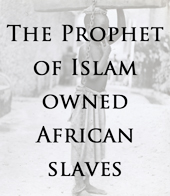The Truth:
Here
is the real story on which that excerpt (of Muhammad 'liberating a slave') is based:There came a slave and pledged allegiance to Allah's Apostle on migration; he (the Holy Prophet) did not know that he was a slave. Then
there came his master and demanded him back, whereupon Allah's Apostle (may
peace be upon him) said: Sell him to me. And he bought him for two black slaves,
and he did not afterwards take allegiance from anyone until he had asked him
whether he was a slave (or a free man) (Sahih Muslim
3901).
Muhammad actually “purchased” the slave by trading two black
slaves, which is hardly a shining example of emancipation. Not only that, it
establishes the fact that Muhammad owned and traded African slaves. As a wealthy
businessman, he certainly could have liberated all three slaves, but chose instead to sell the two Africans into an uncertain future.
It is also obvious from the passage that Muhammad felt he had been conned
into liberating the slave who had come to him, since he was not told of his
status as a slave. Because, of this, Muhammad decided that he would not be
duped again. In the future, he would always ask first about whether a man was free or not before deciding
whether to accept allegiance.
There is also no record of Muhammad “liberating” slaves captured in battle,
unless there was something to be personally gained from it. In fact, he made slaves out of those who were previously free people,
particularly if they were women and children. Sometimes he used families as
leverage to force their men into accepting Islam: The apostle told them to tell Malik that if he came to him as a Muslim he would
return his family and property to him and give him a hundred camels. (Ibn
Ishaq/Hisham
879)
Captured women were passed out like party favors to his men, some of whom
were then
passed along to others (just like the Islamic State does with Yazidi women). This passage tells of Muhammad giving women as sex
slaves to the three men who would become his successors, the future caliphs Umar,
Uthman and Ali: The apostle gave Ali a girl called Rayta; and he gave Uthman a girl called
Zaynab; and he gave Umar a girl whom Umar gave to his son Abdullah. (Ibn
Ishaq/Hisham
878, Ibn Kathir v.3 p.481)
Allah gave Muslim men a divine mandate to keep as many sex slaves as they wished
(Quran 4:24,
33:52…). Contemporary apologists sometimes pretend that this applies
only to women captured in battle (see also Myth: Muhammad Would Never
Approve of Rape), but the same privilege is granted to believing
men in 70:30,
a passage “revealed” to the Muslims in Mecca, when there had been no battles.
Much could be written about Muhammad’s prolific and well-documented relationship
with slaves, but one of the most insightful examples comes from this hadith
(which is repeated elsewhere): The Prophet sent for a woman from the emigrants and she had a slave who was a
carpenter. The Prophet said to her "Order your slave to prepare the wood
(pieces) for the pulpit." So, she ordered her slave who went and cut the wood
from the tamarisk and prepared the pulpit, for the Prophet. When he finished the
pulpit, the woman informed the Prophet that it had been finished. The Prophet
asked her to send that pulpit to him, so they brought it. The Prophet lifted it
and placed it at the place in which you see now. (Bukari
47:743)
According to this hadith, the very pulpit that Muhammad preached Islam from was constructed from slave
labor on his command! Now does this sound like Muhammad had a problem with
slavery?
|





